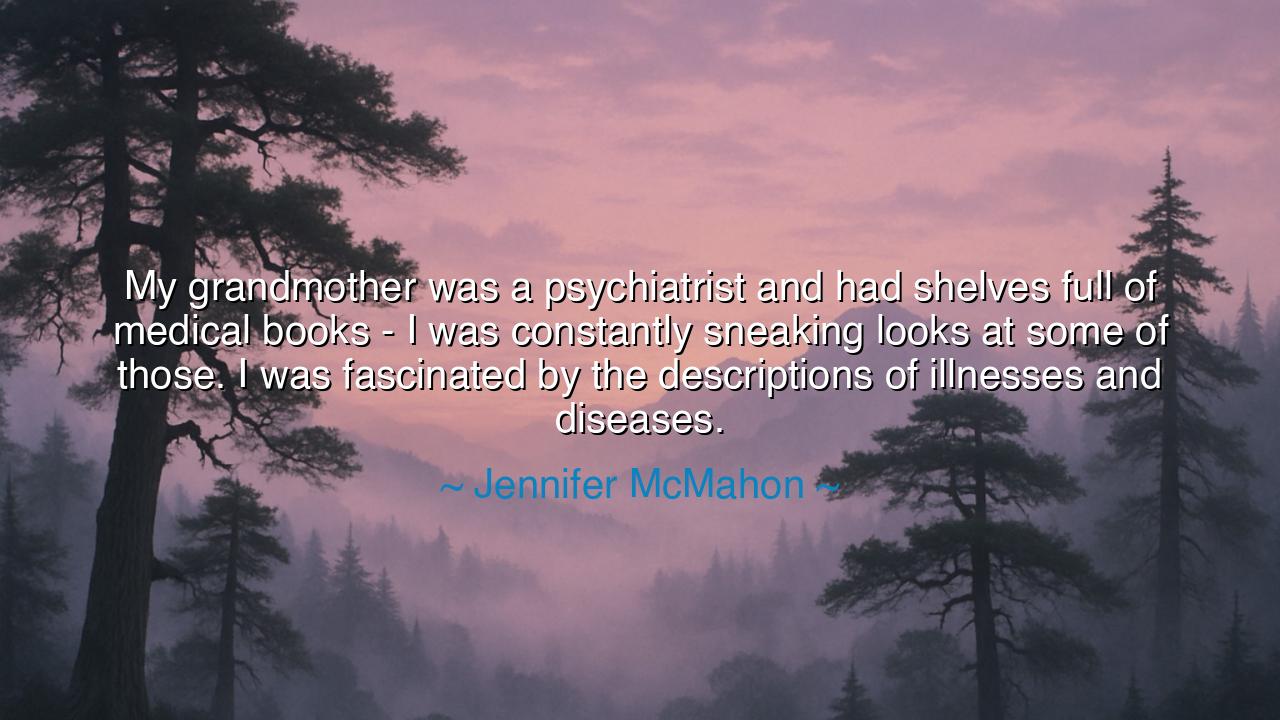
My grandmother was a psychiatrist and had shelves full of medical
My grandmother was a psychiatrist and had shelves full of medical books - I was constantly sneaking looks at some of those. I was fascinated by the descriptions of illnesses and diseases.






When Jennifer McMahon reflected, “My grandmother was a psychiatrist and had shelves full of medical books—I was constantly sneaking looks at some of those. I was fascinated by the descriptions of illnesses and diseases,” she revealed a truth as ancient as the fires where elders once told stories to the young: the spark of destiny often begins in childhood curiosity. What begins as a glance at forbidden or mysterious knowledge can grow into a lifelong passion, shaping the path a soul must walk. The books on those shelves were not hers by right, but they became hers by desire—an inheritance of wonder passed down not by will, but by fascination.
The psychiatrist grandmother becomes here a figure of wisdom, a guardian of knowledge, a keeper of truths about the mind and its struggles. Her shelves full of medical books were like temples of learning, sacred halls lined not with marble but with pages, whispering of mysteries both fearful and profound. And the young McMahon, drawn as though by fate, sneaked looks at those texts, tasting forbidden fruit that was both terrifying and alluring. In this act, we see the eternal story of the seeker—one who dares to peek into hidden realms, not for mischief, but because the soul demands it.
To be fascinated by illnesses and diseases is not morbidity; it is compassion in its earliest form. For the study of suffering is the first step to understanding it, and understanding is the doorway to healing. From Hippocrates in ancient Greece to Avicenna in Persia, the great physicians were those who gazed deeply into the wounds of humankind, who studied the strange shapes of affliction, not to revel in pain but to relieve it. McMahon’s childhood wonder echoes this ancient pattern: that those destined to create or to heal often begin by marveling at the very things others turn away from.
Consider the story of Marie Curie, who as a child would secretly read and study at her father’s desk after hours, stealing knowledge like embers from a sacred fire. Those early, secret moments of curiosity became the foundation of discoveries that changed the world. So too, McMahon’s sneaking glances into the world of medicine did more than feed a child’s imagination—they planted seeds of understanding, shaping the creative force that would later manifest in her writing, rich with human complexity and depth.
Her words remind us that true calling often begins not in duty but in curiosity. The ancients taught that the gods leave signs along our paths, small clues to guide us. For McMahon, those clues were the leather-bound spines of medical texts, the haunting words describing human frailty, the images of illnesses that most would shun. And yet, instead of recoiling, she leaned closer. The child who does not flinch at the sight of human suffering is the adult who may later interpret it with wisdom, whether through healing hands or through the pen that brings stories to life.
For us, the lesson is radiant: do not ignore the things that fascinate you, even if they seem strange to others. Do not suppress the quiet urges that draw you to certain books, certain places, certain mysteries. These are not accidents; they are signals of your inner path. What you sneak glances at today may become the lantern of your tomorrow. The shelves you are drawn to may hold the very tools of your destiny.
Practical action follows this wisdom: nurture your curiosity. When something fascinates you, chase it—not timidly, but boldly. Read, study, observe, ask questions, and let no one shame you for the things that stir your spirit. If you are drawn to darkness, seek to transform it into light. If you are drawn to suffering, let it teach you compassion. For in the things that grip your imagination, the outline of your purpose can be found.
Thus, McMahon’s words stand not merely as a memory of childhood, but as an eternal teaching. The shelves of knowledge await each of us, filled with mysteries, trials, and wonders. Whether we sneak a glance or stride boldly into them, our destiny depends on how we answer that call. Let us, then, be like the child who could not resist the pull of wisdom, and in our own way, let us embrace the fascination that leads us toward truth, creativity, and service to others.






AAdministratorAdministrator
Welcome, honored guests. Please leave a comment, we will respond soon